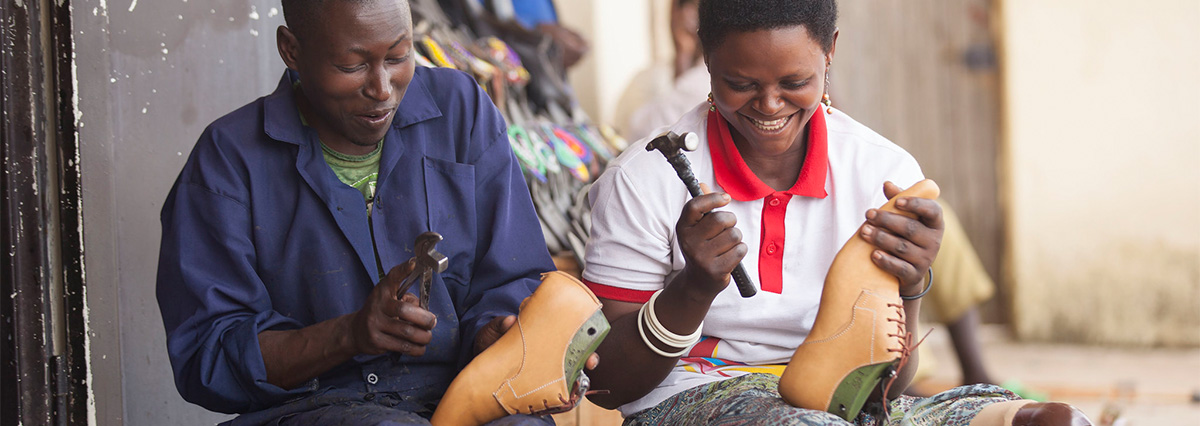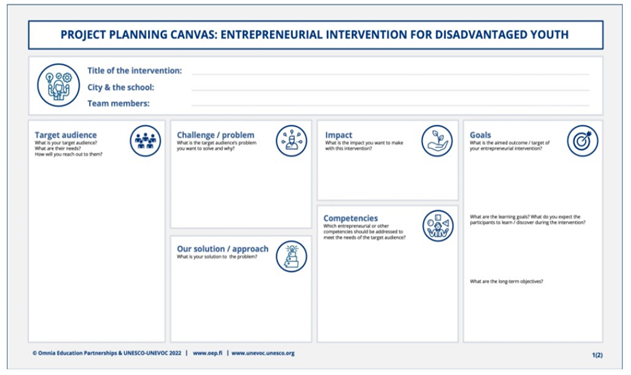
30 June 2022
The COVID-19 pandemic has intensified existing inequalities in access to jobs and education. Furthermore, disrupted labour markets have resulted in decreased hiring, which disproportionately affects young people and already disadvantaged groups.
Girls and women in particular face challenges in returning to work and school after the pandemic, with studies suggesting that fewer women than men will regain employment during the COVID-19 recovery. Given the turmoil and uncertainty, there is an urgent need for policies and practices that support job creation. One way to provide young people with the tools to overcome the risk of un- and underemployment is to develop their entrepreneurial skills and mindsets.
Entrepreneurial learning builds on the essential 21st century skills that demand all individuals develop the capacity to be creative and innovative at work and in their communities. While building entrepreneurial skills and mindsets is essential for all youths, it is more critical for out-of-school youth who face unfavourable social, political, and economic environments. It is essential for TVET trainers and managers to design and deliver entrepreneurial programmes aimed at navigating through these difficulties, to provide a positive effect on breaking barriers such as the inability to take risk, fear of failure, low confidence, constantly evolving and changing jobs/skills and changing labour market conditions.
In response to this need, UNESCO-UNEVOC engaged 12 teams from 6 countries (Ghana, Indonesia, Kenya, Mauritius, Philippines and Tanzania) in May and June 2022, to participate in a capacity-building programme on entrepreneurial learning for out-of-school youth. The programme aimed at equipping TVET teachers and managers with the skills and knowledge to design and deliver the type of entrepreneurial learning that helps to bring out-of-school youth back into the economic mainstream and give them a sense of meaning and belonging by either opening ways for self-employment, business/venture creation or by helping them to become intrapreneurs with high problem-solving skills.
The programme was implemented in collaboration with Omnia Education Partnerships and consisted of three modules based on UNESCO-UNEVOC’s Practical Guide on Entrepreneurial Learning in TVET for Disadvantaged Youth (draft) and the results of the needs assessment conducted at the start of the programme in January and February 2022, in which 92 participants from the 6 countries in Asia and Africa took part.
From the needs assessment, seven challenges on delivering entrepreneurial learning for out of school youth, particularly girls and women were identified:
The first module – Knowledge – provided the required knowledge to understand what entrepreneurial learning is, who are the out-of-school youth in various contexts, what are their challenges and needs, and what are the benefits and advantages of entrepreneurial learning for out-of-school youth. This module equipped TVET teachers and managers with basic knowledge to recognize an otherwise overlooked opportunity and planted a seed for the second module – Mindset.
The second module – Mindset – focused on how to move from fixed mindset to growth mindset by answering to challenges of current courses lacking the connection with real world practices, the teachers lacking skills to deliver entrepreneurial learning, and disadvantaged youths' low motivation and negative attitude towards entrepreneurship.
One participant suggested, “Efficient entrepreneurship practice is to make the training practical in nature where trainees are given tasks and projects to accomplisht, which will give them real practical experience to start their own ventures.”
It was also noted by another participant, “Disadvantaged girls and women need training to change their mindset, so that they can understand how entrepreneurship can change and transform their lives - changing their mindset from a fixed mindset to a growth mindset, which will help them to believe in their talents and what they are doing.”
This module therefore equipped TVET trainers with skills for a more entrepreneurial mindset, by discussing topics such as problem-solving, creativity, innovation, acknowledging one’s own skills and passions, risk-taking and learning from failure, resilience, thinking outside-of-the box, learning from setbacks, critical thinking and initiative, collaboration as well as continuous learning.
The third module– Skills – built the capacities of the TVET institutions to design, develop and implement entrepreneurial learning for out-of-school youth. This module sought to answer the challenges of unsupported infrastructure and facilities, inefficient channels of spreading the information about the programmes, and the low enrolment and limited ability of out-of-school youth to be physically present at the centre.
A participant observed, “Trainees do not have hands-on skills on business development, therefore workshops and educational tours for practical exposures on real time businesses would be important.”
Participants developed a project plan for an entrepreneurial learning intervention for out-of-school youth and submitted their project planning canvases on entrepreneurial intervention using Table 1 as a guiding document. One of the participants noted, “The main challenge is that there are no follow-up methods put in place or feedback put in place.”
The capacity-building programme was designed to enhance a more hands-on culture of entrepreneurial learning in participating TVET institutions, instead of purely theoretical learning. A similar training is set to take place in 2023.
Table 1: Project Planning Canvas
Designing entrepreneurial learning in our context

Get in touch